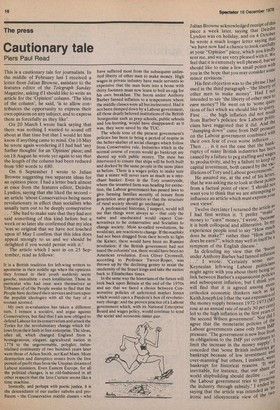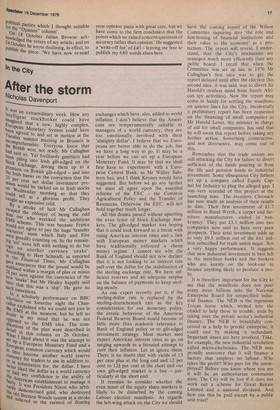The press
Cautionary tale
Piers Paul Read
This is a cautionary tale for journalists. In the middle of February last I received a letter from Julian Browne, assistant to the features editor of the Telegraph Sunday Magazine, asking if I should like to write an article for the 'Opinion' column. 'The idea of the column', he said, 'is to allow contributors the opportunity to express their own opinions on any subject, and to express them as forcefully as they like'.
On 20 March I wrote back saying that there was nothing I wanted to sound off about at that time but that I would let him know if anything came to mind. On 10 May he wrote again wondering if I had had 'any further thoughts' for an 'Opinion' piece; and on 18 August he wrote yet again to say that the length of the column had been reduced from 980 words to 680.
On 6 September I wrote to Julian Browne suggesting two separate ideas for an opinion piece. I had a letter back almost at once from the features editor, Deirdre Lyndon, saying that she liked the second an article 'about Conservatives being more revolutionary in effect than socialists who usually turn out to be deeply conservative . ..' She had to make sure that they had not said something of this kind before but a week or so later she confirmed that my idea 'was so original that we have not touched upon it! May I confirm that this idea does appeal strongly to us and we should be delighted if you would persist with it.'
The article which I sent in on 25 September, read as follows:
It is a British tradition for left-wing writers to apostatise in their middle age when the opinions they formed in their youth suddenly seem gauche, unrealistic even totalitarian. Those in particular who had once seen themselves as Tribunes of of the People awake to find that the People have declined their services and turn upon the populist ideologies with all the fury of a woman scorned.
My own re-evaluation has taken a different turn. I remain a socialist, and argue against Conservatives, but find that I am now obliged to defend Labour for its conservatism and attack the Tories for the revolutionary change which follows from their faith in free enterprise. The ideas, after all, which changed England from a homogeneous, elegant, agricultural nation in 1778 to the ungovernable, polyglot, industrialised community of two hundred years later were those of Adam Smith, not Karl Marx. More destruction and disruption comes from the free pursuit of profit than from the Utopian dreams of Labour ministers. Even Eastern Europe, for all the political changes, is so old-fashioned in all other respects that the lron Curtain seems like a time machine.
Ironically, and perhaps with poetic justice, it is the descendants of our earlier nabobs and profiteers the Conservative middle classes who have suffered most from the subsequent unlimited liberty of other men to make money. High wages in private industry have made servants so expensive that the man born into a home with thirty footmen must now learn to boil an egg for his own breakfast. The boom under Anthony Barber fanned inflation to a temperature where the middle classes were all but incinerated. Had it not been damped down by a Labour government, all those dearly beloved institutions of the British bourgeoisie such as prep schools, public schools and fox-hunting, would have disappeared: as it was, they were saved by the TUC.
The whole tone of the present government's policies has been to bring a period of respite in the helter-skelter of social changes which follow from Conservative rule. Industries which in the normal course of events would go bankrupt are shored up with public money. The state has intervened to ensure that ships will be both built and docked by the same people in the same place as before. There is a wages policy to make sure that a miner will never earn as much as a tilerchant banker. Even in the Tory countryside, where the tenanted farm was heading for extinction, the Labour government has passed laws to give farming families security of tenure from generation unto generation so that the structure of rural society should go unchanged.
A professional historian, I suspect, would tell me that things were always so that only the naive and uneducated would expect Conservatives to be conservative and Socialists to change society. Most so-called revolutions, he would say, are reactions to change. If the muzhiks had not been dragged from their hovels to fight the Kaiser, there would have been no Russian revolution: if the British government had not taxed the colonists' tea, there would have been no American revolution. Even Oliver Cromwell, according to Professor Trevor-Roper, was thrown up by the declining gentry to resist the modernity of the Stuart kings and take the nation back to Elizabethan times.
In the same way the historians of the future will look back upon Britain at the end of the 1970s and say that we faced a choice between Conservative policies of unfettered market forces which would open a Pandora's box of revolutionary change: and the proven practice of a Labour government which, with its National Enterprise Board and wages policy, would continue to tend the social and economic status quo. Spectator 16 December 1978 Julian Browne acknowledged receipt of this piece a week later, saying that Deirdre Lyndon was on holiday, and on 4 October he wrote a much longer letter saying that 'we have now had a chance to look carefully at your "Opinion" piece, which you kindlY sent me, and we are very pleased with it. We feel that it is extremely well phrased, but we should like to raise a few small points with you in the hope that you may consider Sane minor revisions.' His first objection was to the phrase! had, used in the third paragraph 'the liberty 01 other men to make money'. Had 1104 intended to say 'the liberty of other men to earn money'? He went on to 'some glieS' tions of fact which we should like to querY,' First . . . the high inflation did not result from Barber's policies: few Labour politicians have suggested that it did. Arid the "damping down" came from IMF pressure on the Labour government combined with their own fear of even worse inflation • • Then . is it not the case that the bankruptcy of many British industries has been caused by a failure to peg staffing and wages to productivity, and by a failure to keeP UP capital investment, both caused by the vs9c,illations of Tory and Labour governments . He assured me, at the end of his letter, that he was asking me to look at these points from a factual point of view: should 11° want you to think that we are attemPL-0,,, influence an article which must express Y°."own views'. I Twelve vier first days i r I rte. l returned tl artie d f akleeas„ money to "earn" money,' I wrote, 'because it is both colloquial and alliterativeIn r°11 experience people tend to say "How rns,.-h does he make?" rather than "How mu". does he earn?", which may well in itsel!he" symptom of the English disease.' In defending my view that the bO0tO under Anthony Barber had fanned infl3t1°" . . I wrote: 'Certainly some ne°' Keynesian left-wing Labour politicians might agree with you about there being .11° link between Barber's expansionist is, —licles and subsequent inflation; but I think Y°''' will find that it is agreed among 111°„„r.e orthodox economic thinkers such as 31 Keith Joseph (sic) that the vast expansion 03 the money supply between 1972-1973 (Mt) rose at an annual rate of nearly 30 per eell,:f led to the high inflation in the first years/ the second Wilson government'. Nor „dim'''sh" e agree that the monetarist policies oi Labour governments came only from I pressure. 'The government is now free fr°"' its obligations to the IMF yet continues t°1 limit the increase in the money supPlY%0 conceded that 'some British industries gd bankrupt because of low investment all„t over-manning' but others, I insisted, we", bankrupt for historical reasons. 'It 'Nei inevitable, for instance, that our share °t world shipbuilding should decline • ,Yvee the Labour government tries to pres°,:bv the industry through subsidy.' I endeu, saying that the article was intended as so ironic and idiosyncratic view of the Political parties which I thought suitable for the opinion„ column'. On 18 October Julian Browne acknowledged the return of my article; and on 24 October he wrote declining, in effect, to publish the piece. 'We have now re-read your opinion piece with great care, but we have come to the firm conclusion that the points which we raised concern questions of accuracy rather than opinion.' He suggested a 'write-off fee' of £40 — leaving me free to publish my 680 words elsewhere.



































 Previous page
Previous page